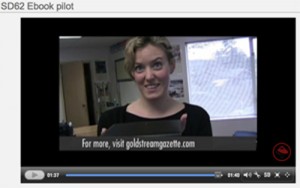Entries from April 2009
The World Digital Library, operated by UNESCO & the American Library of Congress launched today with content from the span of continents. There is not a great deal of content, mind you – not yet, in any case. And what there is, is sometimes curious (for e.g. North America: USA: Arts & recreation: Music: … yields 4 pictures: Pow-Wow Princess Song [which is actually a video]; A scan of a letter from Linda Kelly, Sherry Bane, and Mickie Mattson to President Dwight D. Eisenhower Regarding Elvis Presley; A photograph of two young Polynesian women, one playing the ukulele; and A photograph of Elvis Presley meeting with President Richard M. Nixon at the White House). The navigation is a bit of a puzzle (for instance, it’s not clear why the Heading under North America for Place: United States of America: subdivides into “Narrow Results” that list Cuba, Sierra Leone, Mexico, Canada, Russian Federation, Brazil, Spain, France, Bolivia, Bahamas … and then link to “more” – and following the paths displayed in the blue top box, does not make much sense). Nevertheless, its mission is an interesting one:
“to promote international and intercultural understanding, expand the volume and variety of cultural content on the Internet, provide resources for educators, scholars, and general audiences, and to build capacity in partner institutions to narrow the digital divide within and between countries.[1] It aims to expand non-English and non-Western content on the Internet, and contribute to scholarly research. The library intends to make available on the Internet, free of charge and in multilingual format, significant primary materials from cultures around the world, including manuscripts, maps, rare books, musical scores, recordings, films, prints, photographs, architectural drawings, and other significant cultural materials.[2][3][4]” – Quoted from Wikipedia
It is a project with great promise.
Tags: Digital Literacy · Digital Resource
It’s been interesting to see the way that games are shaping visual literacy, and how it has impacted on expectations at the cinema, the structure of narrative, and etc. Here is a piece on using games in the classroom from way back in July 2008 (games change our perception of time, too).
Academic Commons
Tags: Digital Literacy · digital media in the classroom
This quote is from an interesting piece entitled ‘7 Things You Should Know About QR Codes.’ The full pdf is available from Educause.edu
“QR codes link the physical world with the virtual by providing on-the-spot access to descriptive language and online resources for objects and locations. In this way, the codes support experiential learning, bringing scholarship out of the classroom and into physical experience. They offer expanded pedagogical value in exercises that draw students into creating and contributing content. In history projects, students might research information about local sites, write up what they have learned, generate QR code for their content, post the codes at key destinations, and tour the sites where a network of information from other students has been posted. Such exercises move students outside the bounds of the campus and into city centers, historic neighborhoods, and manufacturing districts, where learning becomes a matter of exploration. Because much of the information in QR codes is browser-based, students engaged in study abroad can use the codes to read websites in their native languages or turn a local destination into a foreign-language lesson. Finally, the greatest importance of QR codes could lie not in their specific use, which may be superseded by newer codes and interpreters, but in the opportunities they offer for moving away from keyboards as input devices in learning environments.”
Tags: Digital Literacy
 LINK
LINK
“Teaching for the 21st Century” is a collaborative initiative between British Columbia School District 62 (Sooke) and faculty at the University of Victoria, the University of British Columbia, and Simon Fraser University. The project is garnering some attention and was highlighted by the Goldstream Gazette earlier this week. Researcher-practitioners teaching in a Victoria-area school are joining forces with university researchers to examine the use of and possibilities for e-readers in high school settings. Two classes of students in a Victoria-area school have been given Sony E-Readers. The Electronic Textual Cultures Lab at the University of Victoria is building a corpus of electronic texts comprised of classroom readings with the expert help of Serina Patterson, and these texts have been loaded on the e-readers so that students have all of their materials on one machine. A team of researchers, including Teresa Dobson (UBC), James Nahachewsky (UVic), Ted Reicken (UVic), Ray Siemens (UVic), Devon Stokes-Bennett (West Shore Centre for Learning and Training), and Kirsten Uszkalo (SFU) will study the way in which students employ these devices in their learning.
Tags: Digital Literacy
Educational Quarterly has updated its online-only format with multimedia and community-building applications. Its most recent edition features a special issue on Learning Spaces, presenting some interesting possibilities.
Tags: Digital Literacy
This is a quote, perhaps scary, certainly funny, from the information page explaining Google Mail’s new feature, “Autopilot,” designed to ease workload by allowing a bot to answer your Email when you don’t have time:
What happens if a sender and recipient both have Autopilot on?
Two Gmail accounts can happily converse with each other for up to three messages each. Beyond that, our experiments have shown a significant decline in the quality ranking of Autopilot’s responses and further messages may commit you to dinner parties or baby namings in which you have no interest. (See Autopilot)
An April Fools prank, perhaps?
Tags: April Fools


